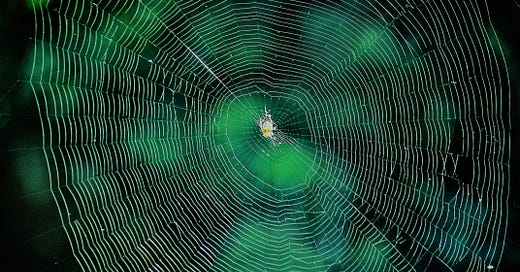What does the Crossword non-fiction bestseller list tell us about India's urban elite?
.. or Why we started The 6% Club
Atomic Habits. The Psychology of Money. Ikigai. The Courage to be Disliked
Self-help, personal development and personal finance feature heavily on this list. And if you’ve wandered into a bookstore recently, you know what other titles would feature here. But what does it tell us about India’s English-educated urban elite?
Photo by Oleksandr Brovko on Unsplash
They (and I) are all trying to figure life out. We are like spiders building webs – Many webs span gaps between objects that the spider cannot cross by crawling. So it first produces a fine adhesive thread to drift on a faint breeze across a gap. When it sticks to a surface at the far end, the spider feels the change in the vibration. The spider reels in and tightens the first strand, then carefully walks along it and strengthens it with a second thread. This process is repeated until the thread is strong enough to support the rest of the web.
The first threads are often our jobs and businesses – Whatever we need to make money and pay the bills. We need to strengthen it to start building a life for ourselves.
After strengthening the first thread, the spider makes a Y-shaped netting. The first three radials of the web are now constructed. More radials are added, ensuring the distance between each radial and the next is small enough to cross. This means that the number of radials in a web directly depends on the size of the spider plus the size of the web. It is common for a web to be about 20 times the size of the spider building it.
These radials are our guidelines and support systems – Mostly the people in our lives. They ensure that our lives are more than just about ourselves. These radials help us bridge gaps and close chasms.
After the radials are complete, the spider fortifies the centre of the web with about five circular threads. It makes a spiral of non-sticky, widely spaced threads to enable it to move easily around its web during construction, working from the inside outward. Then, beginning from the outside and moving inward, the spider methodically replaces this spiral with a more closely spaced one made of adhesive threads. It uses the initial radiating lines and the non-sticky spirals as guide lines. After the spider has completed its web, it chews off the initial three centre spiral threads then sits and waits, usually with the head facing downwards.
The act of fortifying the centre is for the self. This is where built on the first thread and radials, the spider finally sits and waits.
The trouble with modern humans is that we don’t know where our centre lies. One where we could sit securely in a life built on the bulwark of first threads and radials, of work and relationships. Instead of building the centre, we end up building more work and relationships into our lives. And that is where we rest. This de-centred self is forever dissatisfied, and it results in us reaching out towards self-help and personal development books. These books are reminders to us that we need to look deeper within ourselves and introspect, and help define our ever-elusive centre.
I wrote this as we (Deepak Gopalakrishnan aka Chuck and I) were on the cusp of launching The 6% Club. I wondered, should our purpose be to help people in the journey of looking for their centres?
Kurt Vonnegut once remarked
Practice any art, music, singing, dancing, acting, drawing, painting, sculpting, poetry, fiction, essays, or reportage, no matter how well or badly, not to get money and fame, but to experience becoming, to find out what's inside you, to make your soul grow.
Should our purpose be to make people’s souls grow? In a world filled with jargon-heavy vision and mission statements, could there be a nobler reason for The 6% Club to exist?
The 6% Club is India’s first creator coaching program, designed for people with full-time jobs. We take you from idea to launch in 45 days.





Reminds me of the time George Mallory being asked why he wanted to climb the Everest and his reply..."Because it's there". Nicely written Utsav
So nicely written Utsav. I had to read it more than once. The centring also comes from a sense of retrospection and we are so lost that we forget to think who we are. I recall a quote “we live with a stranger all our lives & never ask who am I”. Our work identity becomes our identity. Or being a dad/husband/divorcee is an identity. But is it?